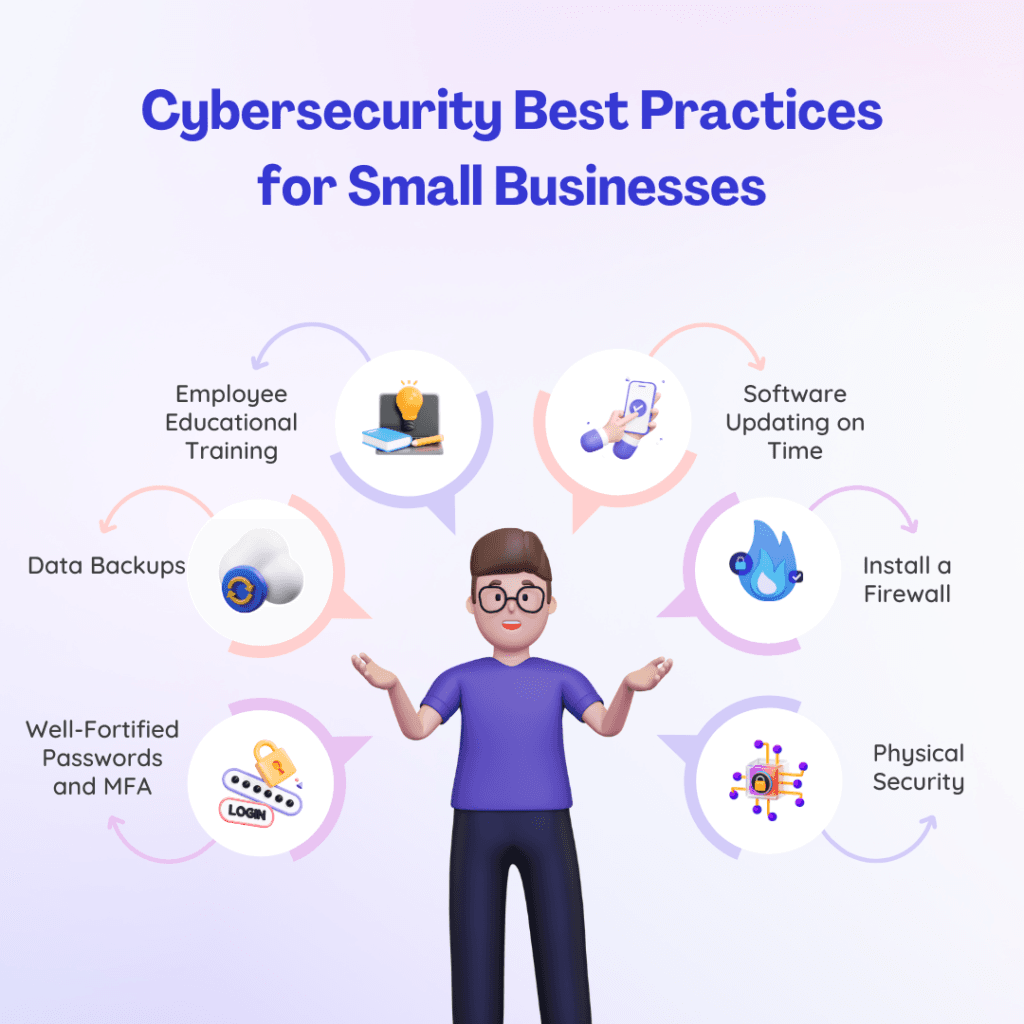Small businesses are the backbone of the economy. But with great opportunity comes great responsibility, especially regarding cybersecurity best practices for small businesses. Data breaches can be destructive, leading to financial losses, reputational damage, and even legal trouble.
The good news is? We’ve penned this guide to help you in the most needed time. Let’s explore the best cybersecurity practices for small businesses, empowering you to create a robust defense against cyber threats.
Why Cyber Security Solutions Matters for Small Businesses?
Think you’re too small for hackers to target? Think again. Small businesses are often seen as easier targets due to a perceived lack of sophisticated security measures. Hackers can steal valuable customer data, financial information, and intellectual property, crippling your operations.
Here’s a breakdown of the consequences cyberattacks can have on your business:
Financial Loss: Recovering from a data breach can be expensive, involving IT remediation, legal fees, and customer compensation.
Reputational Damage: A security breach can erode customer trust, leading to decreased sales and brand loyalty.
Operational Disruption: Cyberattacks can disrupt your daily operations, hindering productivity and customer service.
Legal Issues: Depending on the nature of the data stolen, you might face legal repercussions for failing to protect customer information adequately.
Also read:- Latest Cybersecurtity Threats and Trends of 2025
Essential Best Cybersecurity Practices for Small Businesses
Now that we understand the importance of cybersecurity for small businesses, let’s delve into the practical steps you can take to safeguard your business.

1. Educate Your Employees: Your First Line of Defense
Employees are often the entry point for cyberattacks. Phishing emails, malware-laden websites, and social engineering tactics can trick even the most conscientious workers.
Conduct Regular Security Awareness Training: Train your staff on cybersecurity fundamentals like identifying phishing attempts, creating strong passwords, and reporting suspicious activity.
Simulate Phishing Attacks: Regularly send simulated phishing emails to test your employees’ awareness and preparedness. This helps identify knowledge gaps and allows you to provide targeted training.
Develop a Culture of Security: Foster a company culture where security is valued. Encourage open communication and empower employees to report suspicious activity without fear of reprisal.
2. Strong Passwords and Multi-Factor Authentication (MFA): The Gatekeepers
Weak passwords are like leaving your front door wide open. Here’s how to create a strong password fortress:
Enforce a Password Policy: Implement a policy requiring strong passwords with at least 12 characters, and a mix of upper and lowercase letters, numbers, and symbols.
Unique Passwords for Each Account: Discourage password reuse across different platforms. Consider a password manager to help your employees generate and store unique complex passwords.
Multi-Factor Authentication (MFA): MFA adds an extra layer of security by requiring a second verification step, like a code from your phone when logging into accounts.
3. Software Updates: Patching the Holes
Software vulnerabilities are common entry points for cyberattacks. Here’s how to stay patched and protected:
Automated Updates: Enable automatic updates for operating systems, applications, and security software to ensure you have the latest security patches.
Regular Scans: Schedule regular vulnerability scans to identify and address weaknesses in your systems.
4. Data Backups: Your Safety Net
Losing all your critical business data in a cyberattack is the biggest loss you can face. And, backups are your safety net:
Regular Backups: Implement a consistent backup schedule for your data, storing backups securely offsite or in the cloud.
Test Your Backups: Regularly test your backups to ensure they are complete and functional.
5. Secure Your Network: The Foundation of Defense
Your network is the backbone of your business. Here’s how to fortify it:
Firewalls: A firewall acts as a security barrier, filtering incoming and outgoing traffic and blocking unauthorized access.
Wi-Fi Security: Use strong WPA2 encryption for your Wi-Fi network and change the default password regularly. Consider separate guest Wi-Fi for visitors.
Limit User Access: Implement a policy of least privilege, granting users access only to the data and applications they need to perform their jobs.
6. Physical Security: Don’t Forget the Basics
The other best cybersecurity practice for small businesses is physical security. Cybersecurity isn’t just about digital threats. Here are some physical security measures to consider:
Physical Security: Don’t forget about physical security measures like locking down servers and workstations when not in use.
Mobile Device Security: With the rise of mobile workforces, implement policies for securing mobile devices and company data accessed on these devices.
Third-Party Risk Management: Assess the cybersecurity practices for small businesses of any third-party vendors you work with.
Top Cyber Security Solutions for Small Business
While implementing these best cybersecurity practices for small businesses will significantly enhance your security posture, consider managed cybersecurity solutions for an extra layer of protection. These cyber security solutions for small businesses can include:
Managed Detection and Response (MDR): MDR providers continuous monitoring and real-time threat detection to identify and respond to cyberattacks quickly.
Security Information and Event Management (SIEM): SIEM tools aggregate data from your various security systems, providing a holistic view of potential threats.
Final Note!
Cybersecurity is an ongoing process, not a one-time fix. By implementing these best cybersecurity practices for small businesses, you can significantly reduce your risk of a cyberattack and ensure the long-term success of your business.
Therefore, if you still feel it’s hard for you and your employees to it all alone, Connect with us for comprehensive cyber security solutions for small businesses. We’ll help you implement these best practices and safeguard your company. Let’s build your digital defense system together!
Frequently Asked Questions (FAQs)
What are the best practices for data security in small businesses?
Small businesses should implement strong passwords, enable multi-factor authentication, regularly update software, train employees on security awareness, and use encryption to protect sensitive data.
What are the 5 C’s of cybersecurity?
The 5 C’s of cybersecurity are Change, Compliance, Cost, Continuity, and Coverage, which help businesses address risks, ensure regulatory adherence, manage expenses, maintain operations, and secure assets.
What are the 5 best methods used for cybersecurity?
The five best cybersecurity methods include firewalls, encryption, multi-factor authentication, regular security updates, and employee training to safeguard networks, data, and systems from cyber threats.







